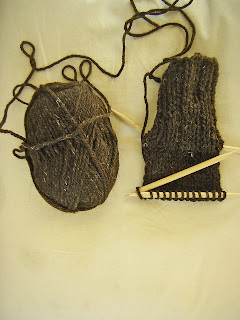And Synge continues somewhere in part III:
' It is likely that much of the intelligence of these people is due to the absence of any division of labour, and to the correspondingly wide development of each individual, whose varied knowledge and skill necessitate a considerable activity of mind. Each man can speak two languages. He is a skilled fisherman, and can manage a curagh (narrow handmade boat) with extraordinary nerve and dexterity. He can farm, burn kelp, cut out pampooties (leather slippers tied with fishing string), mend nets, build and thatch a house and make a cradle or a coffin. His work changes with the season in a way that keeps him free from dullness....'
The crafts have remained, even with modern techniques. That's very inspiring about this place. Something to learn from. As crafts artist Denis Brown recently said in the British magazine 'CRAFTS' : 'Some think tradition means copying the past. But a living tradition must move forward'. We must rethink the importance of traditions, of the crafts that come with them.Which are to be used in a contemporary way. In this way we can revalue design, revalue what we really need, and also the labour it took to make it. Whether it's food, clothes, household ware or accessories. Crafts galore!
the photo's are mine, from 2004























































